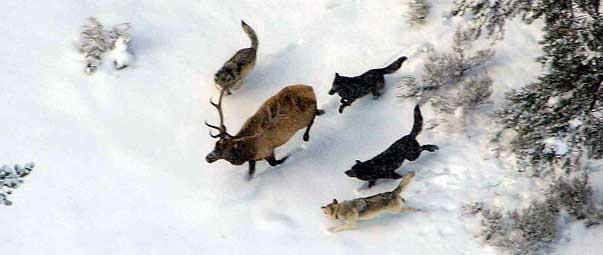|
MISSOULA, Mont.—In letters to legislators and newspapers across the West, the Rocky Mountain Elk Foundation is calling out groups like Defenders of Wildlife, Western Wildlife Conservancy and others for their disingenuous use of data on wolves and elk.
The RMEF action was prompted by each group’s recent op-ed articles in the media, as well as testimony before Utah lawmakers by Western Wildlife Conservancy Executive Director Kirk Robinson. All cited RMEF statistics to argue that restored wolf populations have somehow translated to growing elk herds in the northern Rockies.
“The theory that wolves haven’t had a significant adverse impact on some elk populations is not accurate. We’ve become all too familiar with these groups’ tactic of cherry-picking select pieces of information to support their own agenda, even when it is misleading,” said David Allen, RMEF president and CEO. “We will not allow that claim to go unchallenged.”
RMEF population data, which come from state wildlife agencies, show that elk populations are expanding the most in areas of the northern Rockies where wolves are not present. However, where elk share habitat with wolves, such as the greater Yellowstone area, some elk populations are declining fast. In fact, since the mid-1990s introduction of gray wolves, the northern Yellowstone elk herd has dropped from about 17,000 to 7,100 animals—a 58 percent decline. Other localities in Idaho, Montana and Wyoming also are documenting precipitous downward trends.
Additionally, some research shows that elk remaining in areas of concentrated wolf populations are suffering nutrition loss, lower body weights and decreasing birth rates.
Allen said, “Every wildlife conservation agency, both state and federal, working at ground zero of wolf restoration—Idaho, Montana and Wyoming—has abundant data to demonstrate how undermanaged wolf populations can compromise local elk herds and local livestock production. There’s just no dispute, and emotion-over-science is not the way to professionally manage wildlife.”
RMEF continues to support state-regulated wolf management to include hunting and other viable methods. This position is supported by new reports of diseased wolf populations in the Yellowstone area.
“When wolves are too abundant, they’re more susceptible to diseases, just like all wildlife. The viruses and mange now spreading through wolf packs is another sign of way too many wolves,” said Allen. “Defenders of Wildlife would like to spin sick wolves as a reason to end hunting. But real conservationists know that diseased wildlife populations need better management. Hunting as a management tool delivers that, period.”
He added, “Remember, pro-wolf groups make their living by prolonging this conflict. There is no real incentive for them to admit that wolves are overly recovered. Fundraising is their major motive and they've built a goldmine by filing lawsuits and preaching that nature will find its own equilibrium between predators and prey if man would just leave it alone. That’s a myth. The truth is that people are the most important part of the equation. This isn’t the Wild West anymore. People live here—actually quite a lot of us. So our land and resources must be managed. Wildlife must be managed. Radical spikes and dips in populations show that we should be doing it better. It’s not profitable for plaintiffs, but the rest of us would be better served if the conflict ended and conservation professionals were allowed to get on with their business of managing wildlife, including a well regulated hunting strategy.”
In 2009, RMEF got involved in the ongoing wolf litigation, supporting defendant agencies by filing legal briefs used in federal court to help delist wolves and proceed with hunting—“facts conveniently ignored by groups who misuse our name, data and credibility to prolong the conflict. We stand for elk and other wildlife and what is happening right now is simply not good wildlife management,” said Allen.
See Allen’s letters to editors, Utah Senator Dennis Stowell and more at www.rmef.org.
About the Rocky Mountain Elk Foundation:
Snowy peaks, dark timber basins and grassy meadows. RMEF is leading an elk country initiative that has conserved or enhanced habitat on over 5.6 million acres—a land area equivalent to a swath three miles wide and stretching along the entire Continental Divide from Canada to Mexico. RMEF also works to open, secure and improve public access for hunting, fishing and other recreation. Get involved at www.rmef.org or 800-CALL ELK.
|


